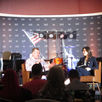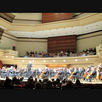New Philharmonic features pianist Winston Choi in its April concerts
- Mar 22, 2019
- 6 min read
Maestro Kirk Muspratt and pianist Winston Choi talk about the MAC’s upcoming concert program.

“Nothing is more difficult than talking about music: if it is a prickly business for musicians, it is almost impossible for anyone else – the strongest, subtlest minds go astray,” said famous French composer Camille Saint-Saëns. His words are true, but today I would like to present two brilliant interviews with Maestro Kirk Muspratt and with acclaimed Canadian pianist Winston Choi who know not only how to talk about music, but actually how to masterfully perform it. On Saturday, April 13 at 7:30 p.m. and on Sunday, April 14 at 3 p.m., Choi will return to the McAninch Arts Center for two concerts with New Philharmonic to perform Saint-Saëns' Piano Concerto No. 2 in G minor. The program will also include Rachmaninoff’s Symphony No. 2 in E minor, Op. 27.
As a strong advocate for music education and youth involvement in studying and performing music, New Philharmonic will open this concert program by sharing the stage with members of the Glenbard West High School orchestra, who will perform the third movement of George Bizet’s “Allegro Vivace” conducted by New Philharmonic Associate Conductor Ben Nadel.
After that enthusiastic presentation, Choi and New Philharmonic under the baton of Maestro Muspratt will present the beauty of Saint-Saëns' Piano Concerto No. 2 in G minor. Being a world-renowned pianist, Choi regularly performs in recitals and with orchestras throughout North America and Europe and tours extensively and internationally with his wife Minghan Xu as a part of Duo Diorama. He is Laureate of the 2003 Honens International Piano Competition in Canada and winner of France’s 2002 Concours International de Piano 20e siècle d’Orléans. What does this acclaimed musician think about the upcoming concerts at the MAC? You can find out below.
Q. Dear Mr. Choi, thank you for this great opportunity to conduct an online interview with you! The western suburbs can’t wait to see you in two performances that will take place on April 13 and April 14 at the McAninch Arts Center in Glen Ellyn. How do you feel in anticipation of these performances? Have you ever performed at the MAC?
A. Yes, this will be my third time performing at the MAC (each time in the past, I played twice). I am very excited about coming back to the MAC. It is an amazing space, one that is so inviting, has such good acoustics, and gives me good vibes!
Q. This concert program consists of two serious compositions - Piano Concerto No. 2 by Saint-Saens and Symphony No. 2 by Sergei Rachmaninoff. You will perform a piano solo in Saint-Saëns’s technically challenging and emotionally intense Piano Concerto No. 2. Have you ever performed this piece? What do you think about it? What is your approach to presenting this composition?
A. Yes, I’ve performed the work, having learned it as a teenager. I love the piece, and in approaching this work (like most other piano concerti), I try to understand its orchestration. I wish to find ways in which the interaction between the piano and various instruments can be brought out, emphasized. There is interdependence between the pianist and the orchestra, and that’s central to how I work on the piece.
Q. What do you think the composer felt when he was writing it? Do you know the story of this concerto?
A. As a musical Renaissance man (composer, film-scorer, organist, pianist, conductor), I think he had such an abundance of ideas that overflowed into this concerto. There are many different styles juxtaposed all together, but presented in his own unique voice. The piece has plenty of humor and lightness, but also beautiful melodies, dramatic moments, and sheer excitement.
Q. What do you feel when you play this piece? Do you relate to this music?
A. It brings out a lot of nostalgia within me, as it is a piece that I essentially grew up with. It played a role in defining my pianism and musicianship.
Q. How was this repertoire chosen? Whose initiative was it to perform this particular composition?
A. Orchestras and conductors usually program their seasons far ahead, trying to find balance within their entire season. So, the piece was already chosen first, and I was then asked to perform it. Luckily, the dates worked out for me, and now I get this wonderful opportunity to play it.

Q. You are the Head of the Piano Program at Roosevelt University's Chicago College of Performing Arts. Do you think music education is important for children and youth? Generally, when should children start learning how to play piano?
A. I think music education is vital in youth. They should start learning probably at the age of 5 or 6. Music education trains hand-eye coordination, allows them to foster their creativity, and helps to build character through patience, determination, and discipline. They also are setting goals for themselves, building confidence, and ultimately, it empowers them.
Q. When did you start playing piano and who influenced you?
A. I started playing the piano at the age of six. My first two piano teachers, Vivienne Bailey and James Tweedie opened up my world to the intricacies and endless rewards presented by classical piano music, and helped to give me the tools to then dive right into it.
This nice interview reflects the opinion of the pianist, but how does Maestro Kirk feel about conducting this concert program? How does the rehearsal process go and what does he think about the music chosen for the MAC’s April concerts? What are the secrets of successful performances? His answers are below.

Q. Dear Maestro Muspratt, thank you for this great opportunity to conduct an online interview with you in anticipation of New Philharmonic’s concert program featuring acclaimed pianist Winston Choi. Have you ever collaborated with Choi, and if yes, when and where did it happen?
A. Yes, I have worked with Winston in the past, with both orchestras. We did the Ravel left hand concerto and the Rachmaninoff Rhapsody on a theme of Paganini.
Q. You have practices now with Winston Choi getting ready to perform Piano Concerto No. 2 written by French composer Camille Saint-Saens. How can you describe your work on this composition? What difficulties do you face and how do you overcome them?
A. We will have two rehearsals with the orchestra with Winston. This is very normal for a concerto whether it is New Philharmonic or any professional orchestra. One night we will go through the concerto with Winston carefully, ensuring that he is comfortable and that the musicians in the orchestra have a chance to create ensemble with the way that Winston approaches the piece. Then in the dress rehearsal, we basically just play through the piece with a few minor adjustments. I will get together with Winston myself in a few days that he and I discuss tempo, special requests, typical tough spots, questions that either of us have.
I myself study the concerto as I would any piece with soloist, looking for challenges that our musicians might have that I can solve with my conducting, ensuring that the orchestra parts are as clear as they can be for our players, troubleshooting problems in the music ahead of time that historically have caused questions or wasted rehearsal time for any orchestra. This particular concerto is very well written and published generally.
Q. What is the most challenging part for you as a conductor when leading the orchestra and the soloist at the same time? Is this piece particularly difficult to conduct?
A. The most challenging part of any concerto is carefully listening to the soloist, understanding his particular interpretation of the piece, and then conveying that to my colleagues in the orchestra. Often on the stage, they cannot hear the soloist and therefore they cannot be certain for example, of the balance or ensemble problems that could be taking place. It is not a particularly difficult concerto to conduct; but may I add that everything is hard to conduct!
Q. New Philharmonic will also present Symphony No. 2 by Russian composer Sergei Rachmaninoff. I know you have a special connection with Russian music and appreciate its deep sense and strong spirit. What can you tell us about this symphony? What message does this composition carry and how do you deliver the meaning of this piece to the orchestra?
A. Yes, I do have a special connect with Rachmaninoff! He is one of my three favorite composers and I cannot really explain in rational terms why he moves me so deeply. He is actually the only composer that I have always felt that I somehow knew in a former life. I call him "rachy" rocky and sometimes when I am studying his music, I talk to him. I know that probably seems pretty wild – but it is the truth. He wears his heart on his sleeve and his melodies are second to none. Additionally, he has a type of understated melancholy in his own personality that I somehow feel powerfully inside of me.
How do I attempt to deliver the messages of the different movements? By being involved inside, by being full of joy inside when it is bubbly and full of sunshine. By being honest, in the sorrowful, dark moments and looking to feel that inside myself at those moments. Inspiring the orchestra when I can and otherwise staying out of their way and letting them just play!
These interviews provide full insight into this concert program, and the MAC is happy to invite everyone to witness the miracle of immortal classical music. This music is difficult to describe but easy to enjoy. For tickets, please go to http://www.atthemac.org/events/winston-choi/ or call 630-942-4000. Tickets are $49. A limited number of $10 student tickets are available with valid student ID.
Natalia Dagenhart
Photo 1: Courtesy of Chad Johnston
Photo 2: Courtesy of New Philharmonic

























Comments